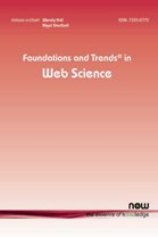 Vía Joho The Blog , he llegado a husmear en la Web Science Research Initiative, donde aparece Sir Tim Berners-Lee junto a otros ilustres académicos del lugar.
Vía Joho The Blog , he llegado a husmear en la Web Science Research Initiative, donde aparece Sir Tim Berners-Lee junto a otros ilustres académicos del lugar.
Husmeando, husmeando, llego a un documento que, tras un primer rápido repaso, me parece de obligada lectura si quieres comprender en forma global esto de la web. Vamos, si te gusta Castells, tira palante, imprime el documento y léelo en pequeñas dosis: A framework for Web Science (PDF completo, 130 páginas).
Detrás de esta pequeña joya de la corona están:
- Tim Berners-Lee y Daniel J. Weitzner, del Computer Science and Artificial Intelligence Laboratory del MIT
- Wendy Hall, Kieron O’Hara y Nigel Shadbolt de la School of Electronics and Computer Science, University of Southampton
- James A. Hendler, del Department of Computer Science, Rensselaer Polytechnic Institute
La presentación del informe por parte del MIT tiene toda la formalidad necesaria para considerarlo como un buen referente en el momento actual:
MIT and University of Southampton launch World Wide Web research collaboration –
Initiative will analyze and shape web’s evolution
«November 2, 2006 – MIT and the University of Southampton today announced the launch of a long-term research collaboration that aims to produce the fundamental scientific advances necessary to guide the future design and use of the World Wide Web.
Comento algunos detalles del documento, a falta de leerlo con más detenimiento.
Abstract
This text sets out a series of approaches to the analysis and synthesis of the World Wide Web, and other web-like information structures. A comprehensive set of research questions is outlined, together with a sub-disciplinary breakdown, emphasising the multi-faceted nature of the Web, and the multi-disciplinary nature of its study and development. These questions and approaches together set out an agenda for Web Science, the science of decentralised information systems. Web Science is required both as a way to understand the Web, and as a way to focus its development on key communicational and representational requirements. The text surveys central engineering issues, such as the development of the Semantic Web, Web services and P2P. Analytic approaches to discover the Web’s topology, or its graph-like structures, are examined. Finally, the Web as a technology is essentially socially embedded; therefore various issues and requirements for Web use and governance are also reviewed.
La estructura del documento ya dice bastante de lo que podéis encontrar:
1 Introduction
2 The Web and its Science
2.1 Web architecture
2.2 Web science: Methodology
3 Engineering the Web
3.1 Web semantics
3.2 Reference and identity
3.3 Web engineering: New directions
4 The analysis of the Web
4.1 Web topology
4.2 Web mathematics
5 Social Aspects
5.1 Meaning, supervenience and symbol grounding
5.2 Web reasoning
5.3 Web epistemology
5.4 Web sociology
6 Web Governance, Security and Standards
6.1 Standards and policies
6.2 Copyright issues
6.3 Transgressive behaviour
6.4 Privacy and identity
6.5 The economics of information and communication
6.6 A liberal hegemony?
7 Discussion and Conclusions
Acknowledgements
References
A mí particularmente me interesa sobremanera el capítulo 5, toda la parte sociológica en torno a la web. Este capítulo parte de que la web is a piece of computing embedded in a social setting, and its development is as much about getting the embedding right as it is doing the engineering. In this section we will look at the social, cognitive and moral context of the Web, and discuss ways in which social requirements can feed into engineering decisions.
Con más detalle en el apartado 5.4, «sociología de la web» se comenta:
The Web is a mirror to human society, and reflects the interests, obsessions and imperatives of 21st century human existence extended over a very wide range (perhaps the widest range of any human information space) of value sets, cultures and assumptions. Analysis of the search terms typed into Google is likely to be a key resource for historians of the future. In this section we will look at the relationship between the Web and its users, readers and authors. What do people and communities want from the Web, and what online behaviour is required for the Web to work? These are especially difficult questions given the radical heterogeneity of the Web – some people want to use the Web for information sharing, some for leisure and entertainment, some want to exploit the distributed information on the Web to perform science in radically new ways, others want an arena for commerce, while still others wish to create and people the sort of anarchistic utopia that has proved so elusive offline
A lo largo de este apartado 5.4. los autores repasan:
- Las comunidades de interés (ver Howard Rheingold).
- Las estructuras de la información (jerarquías, serendipia) con relación a las estructuras sociales de la web.
- La relevancia y las métricas (¿no os suena el discurso sobre rankings que inunda las blogosferas?) donde comentan enlaces, visitas y asuntos por el estilo.
- La confianza y la reputación (pásate por BlogAUT).
- La moralidad y aspectos convencionales de uso de la web: cómo funciona, cómo crece, cómo se gobierna (que se desarrolla en el capítulo 6).
En definitiva, son 138 páginas, mucho para leer y subrayar. Muchas anotaciones para escribir en los márgenes. Saldrán ideas, eso seguro. Algunas pinceladas (los subrayados son míos) de las conclusiones del informe, muy breves para la extensión y densidad del documento:
A move from a document-centric Web to a more thoroughgoing data Web is likely to require more by way of semantic technologies. (trabajo para Joseba Abaitua y cía).
Current trends in Web research will change the nature of the Web itself. Whether this is the emergence of Web services, new models of content sharing such as P2P, the demand for personalisation, widespread automatic Natural Language Processing or the emergence of mobile computing, each of these topics will be legitimate components of our Web Science.
Here the need is for researchers in mathematics and physics, biology and economics to make common cause with engineers and computer scientists to help enrich our understanding of this huge decentralised information system.
Finally, we believe that the arguments about whether a science should be essentially analytic are sterile. We require science to analyse and synthesise. We also suspect there is more art to science and science to art than is often acknowledged. We are more than happy to acknowledge that Web Science is an electic discipline. We also believe that it possesses some of the most challenging and intriguing questions of the 21st century.
Apasionante futuro el que está por venir.


1 comentario
gracias por las ideas, no tuve tiempo de entrar al pdf.